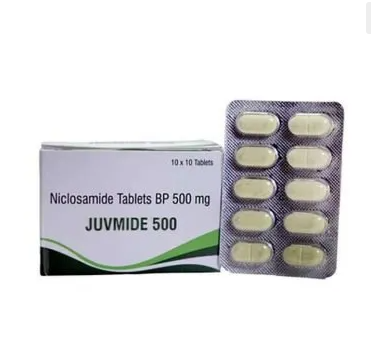Definition of Niclosamide
- Buy niclosamide is a medication that belongs to the anthelmintic (anti-parasitic) class of drugs.
- It is an oral agent use to treat certain parasitic infections in humans.
A brief explanation of its mechanism of action
- Niclosamide works by interfering with the energy metabolism of parasites, leading to their death.
- It specifically targets the mitochondria of the parasites, disrupting their oxidative phosphorylation process.
- This disruption results in the depletion of ATP (adenosine triphosphate), the main energy source for the parasites.
- Without sufficient ATP, the parasites are unable to survive and are eventually eliminate from the body.
- Niclosamide’s mechanism of action is unique to parasites and does not affect the host’s cells.
- This targete action makes it an effective treatment for parasitic infections while minimizing potential harm to the host.
Overall, Niclosamide’s mechanism of action helps to combat parasitic infections by disrupting the energy metabolism of the parasites, leading to their eradication from the body.
Medical Uses of Niclosamide
A. Treatment of Tapeworm Infections
Explanation of tapeworm infections and their prevalence
-
- Tapeworm infections are cause by parasitic flatworms known as tapeworms.
- These parasites can infect humans through the consumption of contaminate food or water.
- Common sources of tapeworm infections include undercooked meat, raw or contaminate vegetables, and poor hygiene practices.
- Tapeworm infections are prevalent worldwide, especially in regions with limite sanitation and hygiene standards.
How niclosamide targets tapeworms
-
- Niclosamide 500 mg is highly effective against tapeworms due to its mode of action.
- It disrupts the mitochondrial function of tapeworms, leading to their paralysis and subsequent detachment from the intestinal wall.
- Niclosamide also interferes with the tapeworms’ ability to absorb glucose, further compromising their survival.
Specific tapeworm infections treated by niclosamide
-
- Niclosamide is primarily use to treat intestinal tapeworm infections, including a. Taenia saginata (beef tapeworm) b. Taenia solium (pork tapeworm) c. Diphyllobothrium latum (fish tapeworm)
- These infections can cause symptoms such as abdominal pain, diarrhea, weight loss, and nutrient deficiencies.
- Niclosamide effectively kills adult tapeworms, helping to alleviate symptoms and prevent further complications.
- It is important to note that niclosamide is not effective against all types of parasitic infections, and its use should be guide by a healthcare professional’s diagnosis and recommendation.
- Proper hygiene practices and food safety measures are crucial in preventing tapeworm infections.
Administration and Dosage of Niclosamide
A. Oral Administration
- Niclosamide is primarily administered orally, meaning it is taken by mouth.
- It is available in tablet or capsule form, which should be swallowed whole with water.
- The medication is typically taken with or after meals to improve absorption and reduce potential gastrointestinal side effects.
B. Recommended Dosage for Different Indications
- The dosage of niclosamide may vary depending on the specific indication and the individual’s age, weight, and overall health.
- It is important to follow the prescribed dosage and duration of treatment as instructed by a healthcare professional.
- The recommended dosage for tapeworm infections is usually a single dose, but in some cases, multiple doses may be required.
C. Importance of following healthcare professional’s instructions
- It is crucial to adhere to the instructions provided by a healthcare professional when taking niclosamide.
- Following the recommended dosage and treatment duration ensures the most effective and safe outcome.
- It is important not to exceed or skip doses, even if symptoms improve, as this can lead to incomplete eradication of the infection and potential relapse.
- If there are any concerns or questions regarding the administration or dosage of niclosamide, it is essential to consult with a healthcare professional for clarification.
- Additionally, it is important to inform the healthcare professional about any existing medical conditions, ongoing treatments, or medications being taken, as they can influence the dosage and potential interactions with niclosamide.
Proper administration and adherence to the recommended dosage of niclosamide, as directed by a healthcare professional, will optimize the effectiveness of the treatment and minimize the risk of complications.
Safety and Side Effects
A. Generally Well-Tolerated
- Niclosamide is generally well-tolerated when taken as prescribed.
- Most individuals experience minimal side effects or none at all.
- The medication has been used for many years with a good safety profile.
B. Potential Adverse Reactions
- While niclosamide is generally safe, there is a possibility of experiencing certain side effects. These can include:
-
- Gastrointestinal symptoms: Nausea, vomiting, abdominal pain, diarrhea, or discomfort.
- Allergic reactions: Rash, itching, swelling, or difficulty breathing.
- Central nervous system effects: Headache, dizziness, or fatigue.
- These side effects are usually mild and transient, resolving on their own without requiring medical intervention.
C. Precautions and Contraindications
- Niclosamide should be use with caution in individuals with certain medical conditions or circumstances, including:
-
- Known hypersensitivity or allergy to niclosamide or relate medications.
- Pregnancy or breastfeeding: Niclosamide should only be use if the potential benefits outweigh the risks, and under the guidance of a healthcare professional.
- Children: Safety and effectiveness in children may vary, so dosage and administration should be carefully determine by a healthcare professional.
- It is crucial to inform the healthcare professional about any existing medical conditions, allergies, or medications being taken to assess the suitability and safety of niclosamide.
If any concerning or severe side effects occur while taking it, it is important to seek immediate medical attention. A healthcare professional can provide guidance, monitor for any adverse reactions, and address any concerns during treatment.
FAQS
1. What is Niclosamide?
Niclosamide is an anthelmintic drug, which means it is use to treat parasitic worm infections. It has been use for many years to combat various intestinal worm infestations, particularly tapeworms. Apart from its anthelmintic properties, Niclosamide has also gain interest for its potential antiviral and anticancer properties, though further research is require in these areas.
2. How does Niclosamide work?
Niclosamide works by interfering with the energy metabolism of parasites, particularly tapeworms. It disrupts their mitochondrial function, leading to a depletion of ATP (the cellular energy currency) and ultimately killing the parasites. In addition to this, it has been suggest that it may also possess antiviral properties by inhibiting certain viral replication processes.
3. What are the side effects of Niclosamide?
Nausea, vomiting, stomach pain, constipation, and itchiness are some of the side effects. Dizziness, skin rash, drowsiness, perianal itching, and an unpleasant taste are rare side effects. Praziquantel is a preferable and equally safe remedy for tapeworm infestation for some of these reasons.




